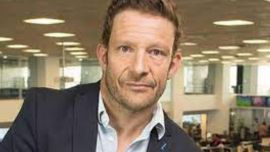Following reports that any deal won’t be sealed until early 2022, President Alberto Fernández told business leaders on Friday that Argentina is “absolutely” committed to agreeing a new financing programme with the International Monetary Fund and restructuring its multi-billion-dollar debt.
Speaking at the 57th IDEA Colloquium in Buenos Aires, the Peronist leader said that Argentina is keen to seal a deal, though he warned he would not rush into anything that would hurt the country and its citizens.
“We’ll keep discussing until we’re sure we’ll have the resources to make Argentina stand on its own two feet again,” he declared. “Only then, will we start paying the debts we’ve inherited.”
The country needs a reduction on the existing interest rates on its debt with the IMF as well as more time to pay back the loan, Fernández added.
Argentina had previously asked the IMF to consider temporary relief on surcharges, commissions charged to countries that use the lender’s credit lines extensively, as well as to conduct a comprehensive review of these policies.
The president’s remarks come just after Economy Minister Martín Guzmán spent the week in Washington DC holding technical and high-level meetings with Fund officials to rework a plan worth over US $44 billion, including a high-level meeting on Tuesday with IMF chief Kristalina Georgieva.
Talks have so far been slow, in part due to Argentina’s upcoming congressional elections to be held in November.
Deal in 2022?
According to reporting by multiple news outlets midweek, Fernández reportedly told a group of eight top businessmen on Tuesday that a deal won’t happen until 2022 at the earliest.
During a meeting with a group of executives – which included representatives from top companies including MercadoLibre, Corporación América, Pampa Energía and Pan American Energy – the Peronist leader said early next year was the most likely time, Bloomberg reported.
On Wednesday, Fernández denied those version of events and said he wanted an understanding “as soon as the conditions are met."
"Yesterday we had an excellent meeting with Argentine businessmen in which, among other issues, I reported on how the negotiation with the IMF is progressing for the debt we inherited from the previous government," the president began in a string of tweets.
"Today we find the cover of the newspaper Clarín that says that, in that meeting, I announced that the agreement with the IMF would be sealed next year. It was not like that. We want to achieve that agreement as soon as the conditions are met," said the president.
Fernández also denied that leaders in the ruling Frente de Todos coalition were split over their approach to the Fund, telling the CEOs: "There are no differences."
Sources cited by the Noticias Argentinas news agency said that the business leaders had asked the government to U-turn on some government policies, including the removal of the temporary ban on laying off workers and a measure forcing firms to double the severance pay of employees if dismissing them without cause."
Nevertheless, the main focus remained on the US$44-billion debt with the IMF, with some executives enquiring about the position of the opposition Juntos por el Cambio coalition, which some felt would need to back any deal if it is to be sustainable.
"The president gave us a lot of confidence in relation to the will to reach an agreement" with the IMF, said Corporación América’s Eduardo Eurnekian after the lunch.
‘Credible and useful’
Speaking on Wednesday after a meeting with Guzmán in Washington DC, Georgieva confirmed that talks were still ongoing over a new “credible and useful” credit programme for Argentina.
Hailing the “commitment of both sides to work constructively" towards a deal, she declined to offer a timetable for a potential agreement.
"We will continue that dialogue," she said at a press conference on the sidelines of the the annual meetings of the IMF and the World Bank. "We have to find a point where an Argentine programme is one that we consider credible and useful to the Argentine people and one that we can support."
Georgieva said that the Fund is seeking a plan accompanied by “sound policies that will be useful in inducing private-led growth, creating more jobs and providing good use of public resources for those most in need."
Recognising that Argentina has asked the IMF to reform its loan surcharge policy, Georgieva said a decision has not yet been made.
"When we discussed it [in September] there were reservations about the surcharges, mainly driven by a genuine concern about the IMF's financial strength at this time of crisis, but that was not conclusive in one way or another," he said.
Meanwhile up north
Guzmán, who remained in the United States after his meetings, was joined by Cabinet Chief Juan Manzur in New York City on Thursday as the duo held meetings with investors, business leaders and political analysts to “explain the vision of the national government.”
Manzur, speaking at Argentina’s Consulate in the Big Apple, told those present that a deal with the IMF is “a national priority that involves all sectors of the Argentine society.”
The government will honour its debt with the Fund and that position “has consensus within Frente de Todos,” he said. “We want to take it to Congress and have the support of all political sectors so that it is approved there."
He said a good deal for Argentina would be “sustainable and allow the country to continue on the path of recovery, not impede it.”
Argentina is seeking to turn its record US$57-billion credit-line granted in 2018 into a new financing programme. The country has received around US$44 billion to date and President Alberto Fernández refused the remaining tranches upon taking office in December 2019.
The government and the IMF are expected to eventually agree an Extended Fund Facility (EFF) programme. Such a scheme is designed to assist countries that are facing severe balance of payment issues in the medium term due to structural deficiencies. Unlike a stand-by agreement, like the deal agreed in 2018 by the Mauricio Macri administration, such programmes normally last some 10 years.
– TIMES/BLOOMBERG/AFP/NA



















Comments